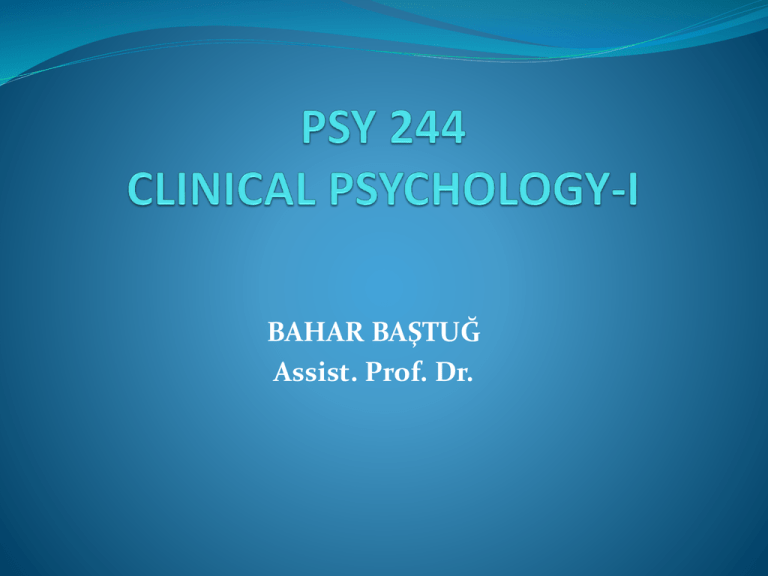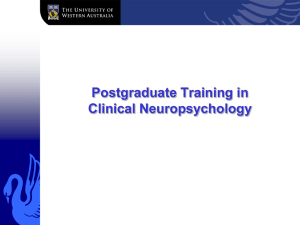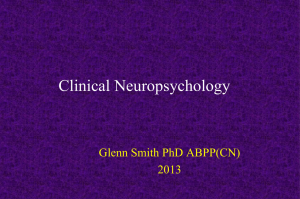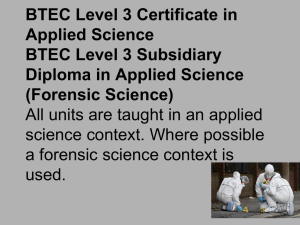
BAHAR BAŞTUĞ
Assist. Prof. Dr.
Lecture Preview
Clinical Neuropsychology
Geropsychology
Forensic Psychology
The clinical neuropsychology
focuses on brain-behavior relationships, how brain
functioning impacts behavior and problems.
Neuropsychologists must be well experienced in
neuroanatomy, neuropathology and clinical psychology.
They assess a range of cognitive abilities such as
executive or higher-order cognitive functions, sensory
and motor functioning, memory skills, and abstract
reasoning.
The clinical neuropsychology
Most neuropsychologists work in hospital,
rehabilitation, or clinic settings. Some specialize in
working with children, a field referred to as child
neuropsychology.
Some of the topics of interest to clinical
neuropsychologists:
head traumas,
Alzheimer’s disease,
stroke,
dementia,
epilepsy,
seizures,
tumors,
alcohol,
malingering,
langauge problems,
impairment due to injury,
impairment due to chemotherapy,
AIDS.
The clinical neuropsychology
Neuropsychologists administer and interpret a wide
variety of specialty test batteries such as the LuriaNebraska Battery and Halstead-Reitan
Neuropsychological Battery and the individual test
such as the Benton Visual Recognition Test,
Wechsler Adult Intelligence Test- IV (WAIS-IV),
Stroop and the Wisconsin Card Sorting Test
(WCST).
The clinical neuropsychology
These tests provide information on the cognitive and
psychological functioning of people with neuropsychological
problems.
Neuropsychologists provide consultation and rehabilitation
services and conduct research into understanding, assessing,
and treating these problems.
Epilepsy
is a seizure disorder that is defined as excessive
electrical discharging of brain cells in a sudden,
temporary and recurrent manner. Seizures result in
intense muscle spasms, a complete or partial loss of
consciousness.
Infections, metabolic abnormalities, and
biochemical factors contribute to the development
of a seizure. Psychological stress provokes seizures
among those vulnerable to epilepsy.
Epilepsy
affects about 1% of the population. Children are more
likely to experience epilepsy than adults; children under
the age of 5 and at puberty are the most vulnerable.
Epilepsy is more likely to occur among lower SES.
Etiology: Biopsychosocial factors:
genetics,
infections,
SES,
stress,
nutrition,
prenatal care contribute to the development of
epilepsy.
Epilepsy
Because of the epileptic seizures, attention, concentration,
memory, problem solving, motor, and intellectual abilities
can be impaired.
In addition to neurological functioning, personality and
mood are altered by seizures. People with epilepsy are at
higher risk for the development of psychiatric problems such
as anx, depr, psychosis, and antisocial behavior.
Epilepsy
Neuropsychologists evaluate the cognitive and
personality functioning of patients with epilepsy.
Neuropsychologists are asked to differentiate seizures
from pseudoseizure disorders and malingering. Some
people present with seizures that are psychologically
based (e.g., hysterical seizures) or intentionally feigne.
Sometimes patients consciously or unconsciously fake
having a seizure disorder for medical attention, financial
or other reasons.
Treatment of epilepsy
reflects biopsychosocial perspectives. Anticonvulsant
medication such as carbamazepine (Tegretol),
Epdantoin and psychotropic medications such as
benzodiazepines, antidepressants, and neuroleptics have
been used to minimize the frequency, intensity, or
duration of seizures. When medications don’t work and
seizures are localized to the temporal lobe, a temporal
lobectomy may be performed.
Brain Injuries
Accidents causing brain injuries occur from
accidents, falls, war wounds, sport injuries,
gunshot wounds, and violent assaults.
Concussions (jarring the brain) occur during
accidents and impact brain functions such
as memory, attention, concentration, and
orientation. Strokes can impair language,
motor skills, personality functioning, and
other neurocognitive abilities.
Environmental toxins such as poisons, gas
fumes, and metals such as mercury and lead
can result in brain injuries.
Brain Injuries
Neuropsychologists evaluate cognitive and psychological
functioning and develop rehabilitation programs for
brain injured patients.
According to the nature of the problem and the special
needs of the patient and family, psychotherapy, group
support, education, and medical treatment may be
involved.
Brain injuries are common among soldiers, footballers
and boxers.
Degenerative Diseases
include Alzheimer’s disease, dementia, Parkinson’s disease,
Huntington’s chorea, and infectious diseases such as syphilis.
Gradual degeneration of neurological functioning results in
problems in memory, attention, speech, judgment, and
movement.
Patients with degenerative diseases develop depr, anx,
irritability, personality changes, and loss of social support.
These patients needs sensitive care from others.
Dementia associated with Alzheimer’s disease (AD) is
the most well-known degenerative disease. AD involves
memory loss, failure to recognize well-known people
and objects, difficulty in organizing and planning,
suspiciousness, and language problems.
It is expected to increase in future years due to the
increase of aging population.
It is more common among people with lower
educational levels and women.
AD may be due to genetically
and environmentally caused
brain atrophy and plaque
formation and low levels of
the brain neurotransmitters
acetylcholine (ACh),
serotonin (5-HT), and
noradrenalin (NA).
Head trauma, malnutrition, drug and toxin exposure, viral
infection, personality, and cultural factors may play a role in
the AD.
Neuropsychologists evaluate the cognitive and psychological
functioning of these patients and assist in making a
diagnosis.
Treatment of AD
Psychologists offer services including psychotherapy,
group support, psychoeducational instructions,
behavior management, and consultation with
physicians, nurses, and other caregivers. Treatment
approaches include family members who have a
caregiving burden and have a loss of a loved one.
Medication includes Aricept
which alter the production of
glutamate and acetylcholine.
http://www.psinema.org/index.php?c=3
Vascular dementia is
another type of dementia.
It is different from the AD.
It is due to cerebral infarct
or blood problems. It
usually occurs after age 50.
In addition to dementia, epilepsy, and brain injuries,
neuropsychology provide information of general
psychological troubles.
Depr is associated with neuropsychological dysfunction
such as head trauma. Also, SCH is associated with
structural and functional abnormailities in prefrontal
cortex.
fMRI, new diagnostic tool, become more common.
fMRI
Conclusion
Neuropsychology is interested in how problems with brain
impact behavior and psychological functioning.
Neuropsychological disorders impact the patient and the
patient’s family.
Neuropsychologists can be helpful in assessment, treatment,
rehabilitation and research about these disorders.
Neuropsychology overlaps with health, child and forensic
psychology.
Geropsychology
The number of elderly people has increased due to
industrialization. People who over the age of 65 is
accepted as elderly people.
Geropsychology is an important and fast-growing
new specialty area of clinical psychology.
Full-time geropsychologists will be needed in Turkey
and the world.
Geropsychology
Many older people experience urinary incontinence,
insomnia, anx, depr, mourning associated with a variety of
illnesses that impact their cognitive functioning such as AD
and stroke. There is no enough social support services or
experiences for elders.
Geropsychologists provide prevention, assessment,
consultation, and intervention services to help elders and
their families deal with the many problems. They provide
treatment for depr, anx, assessing cognitive impairment, and
help cope with the loss of physical and mental functioning.
Degenerative Diseases
AD
Vascular dementia is the second most
common type of dementia. Vascular dementia
is a result of cerebrovascular disease. Blood
flow to the brain stop, it causes tissue
damage. When this happens suddenly, a
stroke occurs.
Hypertension and atherosclerosis can create vascular
dementia.
Atherosclerosis. Cholesterol deposits in the large arteries form
plaque, restricting the flow of blood. This condition, called
atherosclerosis, can result in stroke and heart attack.
Degenerative Diseases
Cognitive and psychological changes are associated with
the physical brain changes. Cognitive and psychological
changes depend on both the nature of the patient’s
premorbid functioning and the specific areas of the
brain that are affected.
Risk of stroke and other vascular dementia increases
with age.
Degenerative Diseases
Parkinson’s disease is another degenerative brain
disorder. It is due to the brain’s inability to adequately
produce the neurotransmitter, dopamine (DA). The
symptoms are involuntary tremors and muscle rigidity.
About half of Parkinson’s disease patients develop
dementia during the advanced stages of the illness.
Parkinson’s Disease
Michael J. Fox
Geropsychologists conduct
neuropsychological testing to
assess the degree of cognitive
and psychological damage
and the strengths of patients.
They participate in
individual, family, and group
psychotherapy and
psychoeducational activities.
Psychiatric Issues in Older Adults
Anx, depr, substance abuse, and mourning are common
among the elderly. Diagnosing and treating these
problems can be difficult. Many of the psychological
problems experienced by elderly people could be related
to comorbid medical problems and medication side
effects. Furthermore , we have no idea what is normal
and not normal for elderly people to experience, yet.
Anxiety
About 15% of elderly people experience an anx disorder. The
anx is related to health, safety, and concerns about the wellbeing of loved ones. PTSD is common among the elderly and
is often associated with mourning regarding the loss of a
spouse or other close relative or friends.
Biopsychosocial approaches using medication, CBT, and
supportive approaches are successful for dealing with anx.
Geropsychologists must work with physicians and family
members.
Depression
Depr can be deadly for elders. The suicide rate among
elder men is the highest. Diagnosis and treatment can
be difficult. Because elders are more likely to report
somatic problems than depressive symptoms.
Depr among the elderly is associated with mourning,
comorbid medical problems, and medication side
effects.
Substance Abuse
Elderly persons experience problems with older adult onset
alcohol abuse and prescription drug abuse. The most
common drugs used by the elderly include diuretics,
cardiovascular medications, sedatives, analgesics, and
laxatives. Older persons metabolize alcohol more slowly, it
leads to higher blood concentrations.
Geropsychologists must be attentive to the potential of
substance abuse among elders.
Forensic psychology
is defined as the “application of psychology to legal issues”.
Forensic psychologists specialize in utilizing principles of
human behavior to inform the judicial and legal systems.
They are trained as clinical psychologists with a specialty in
forensic work.
They conduct psychological evaluations with defendants and
present their findings as an expert witness in court. They
provide evaluations for child custody, or be asked to predict
dangerousness or determine if an individual is suitable to
stand trial.
Forensic psychologists assist in documenting mental distress,
pain and suffering, and brain injury in legal action. Injury
may include physical accidents or psychological traumas
associated with sexual harassment, rape, violence,
discrimination, and others stressful experiences.
Forensic psychologists work in legal cases:
involuntary commitment,
the insanity defense,
child custody,
violence against women, and
jury selection.
Involuntary Commitment
The laws allow someone to be committed to a psychiatric
hospital if they are in serious and immediate danger of
hurting themselves or others. Some people may have suicidal
or homicidal thoughts, some must be protected from
harming themselves or others.
But freedom is a basic human right. Depriving a person of
this important right through forced is involuntary
commitment to a psychiatric hospital.
Throughout the history, commitment to a
psychiatric hospital or prison was used as a means of
controlling people or punishment because of
political, religious, or personal beliefs and activities.
To commit someone against their will has been
abused and continues in many countries.
Involuntary Commitment
K-Pax- Kevin Spacey, 2001
Changeling- Angelina Jolie, Primal Fear- R. Gere & E.
2008
Norton. 1996
Lady-Michelle Yeoh, 2011
It is often unclear if someone is indeed in serious
danger of hurting themselves or others. Predicting
dangerous behavior is very difficult.
Forensic psychologists evaluate a patient using
assessment techniques such as clinical interviews,
cognitive tests, and both objective and projective
personality tests to determine if someone is at high
risk for harm to self or others.
In a survey, WAIS-III, MMPI-2 scales were recommended
to be used in evaluations. The Psychopathy ChecklistRevised (PCL-R) was recommended for risk for violence
evaluations.
Projective instruments such as drawings, sentence
completion tests, and the TAT were found to be
unacceptable to use for forensic issues.
Insanity Defense
The M’Naghten Rule (1843) was named after Daniel
M’Naghten who attempted to kill the prime minister of
England because he felt that the government was persecuting
him. He mistakenly killed the prime minister’s secretary. His
symptoms were consistent paranoid SCH according to DSMIV.
The M’Naghten Rule suggests that someone is not responsible
for his criminal actions if he suffers from a disorder that makes
him unaware of what he is doing or that what he is doing is
wrong.
The Insanity Defense Reform Act of 1984 states
that someone can be found innocent due to reasons
of insanity if he is unable to understand that
criminal behavior was wrong at the time of the crime
due to a mental disease or MR.
Forensic psychologists evaluate these accused offenders
to determine if they suffer from a mental illness that
might meet the legal criteria of insanity. They provide
expert opinion to the court to assist in determining if the
accused person should be held responsible for their
crime.They complete clinical interviews and conduct
psychological evaluations to inform their judgments.
J. Dahmer
J. Hinkley
Dahmer
Dahmer was a notorious serial killer and sex offender in 1991. His long list of offenses
involved sex, cannibalism, necrophilia, and dismemberment. Since he was a child, he
had shown symptoms of withdrawal and avoidance of any social interactions. He would
collect dead animals, then dissect, dissolve, or mutilate them in various ways. He
committed the first murder in 1978, bludgeoning to death Steven Hicks, a hitchhiker
because “the guy wanted to leave and I didn’t want him to.” In September 1987, he
picked up Steven Tuomi at a gay bar and killed him out of impulse, claiming no
memory of the event later in trial. In 1988, he was also arrested for giving drugs and
sexual fondling a 13 year old boy, Somsack Sinthasomphone. As a registered sex
offender, he would then proceed to commit 15 more murders, storing the corpses in
vats. Dahmer kept trophies of his victims such as human skulls and genitalia in the
closet and “saving” biceps and the human heart in the freezer for later consumption.
This happened up to the year 1991 when Tracy Edwarts, a would-be victim overpowered
Dahmer, ran through the streets and waved for the police car.
In the trial, Dahmer pled not guilty by reason of insanity. The plea was subsequently
rejected and Dahmer was convicted of all 15 murder charges and sentenced to 15
consecutive life sentences. The case was seen by many as the death of the insanity plea.
They contended that if a deranged criminal like Dahmer is rejected on the insanity plea,
then no other criminal would qualify for the defense.
J. Hinkley
The next entry on the list is probably the most famous one yet. In 1981, Hinckley
developed an obsession with the movie Taxi Driver, in which Jodie Foster stars as a
child prostitute and Robert Deniro plays Travis Bickle, who plots to assassinate
the presidential candidate in the film. He personally watched the movie 15 times
consecutively and grew infatuated with Jodie Foster. Hinckley then began to stalk
the actress by relocating to New Haven, Connecticut, near Yale University where
she was enrolled. He signed for a Yale writing class, slipped her poems and
messages through her door and calling her persistently. As he grew more
desperate in his attempts, he even considered taking his own life in front of her to
gain her attention. Eventually he decided to attempt an assassination on President
Ronald Reagan. As the president left the Hilton Hotel, he shot six times at
Reagan, wounding a few other people in the process. One of the bullets ricocheted
and hit the president on the chest, who later succumbed to his injuries. Hinckley’s
defense team pled for insanity defense and succeeded, he was acquitted of all of
his 13 charges of assault, murder and weapon counts. Due to the high profile of the
case, the public perceived the insanity defense as a loophole in the legal system
which allowed a clearly guilty criminal to dodge incarceration. The controversy
laid in the fact that prior to the assassination attempt, the insanity defense was
only used in 2% of the felony cases and in those cases failed over 75% of the time.
Nonetheless, most states were pressured to reenact reforms of legislation
regarding the use of the insanity defense.
Child Custody
About half of all marriages end in divorce, with the question
of the children’s custody.
Many years ago, children from divorced families were
routinely given to the father. During the past 30 years, the
mother has been awarded the children and the father has
been allowed visitation rights and ordered to pay child
support. In more recent years, these patterns have been
challenged, joint custody arrangements are being worked.
Joint custody: both parents retain custody of their children
after divorce and that arrangements are made regarding
living and financial matters to accommodate the needs and
wishes of both parents.
Since many divorces are highly conflictual,
cooperation between parents about the care of their
children is difficult to establish in joint custody
arrangements. Children are often placed in the
middle of conflict. When divorced parents remarry,
the complexity often increases.
In addition to child custody arrangements due to
divorce, when child abuse, abandonment, and
neglect occure, the complexity often increase.
SHARON STONE OĞLUNUN VELAYET DAVASINI KAYBETTİ..
'Temel İçgüdü'nün unutulmaz yıldızı Sharon Stone, evlat
edindiği oğlu Roan'ın velayetinin kendisine verilmemesi davasını
üst mahkemeye taşımıştı. Mahkeme tutanağında, annenin
oğlunun ayak kokusu problemini çzömek için botox yaptırmak
istediği bilgisi geçti. Hakim, annenin 8 yaşındaki bir çocuğun
medikal bir problemi için bu kadar tepki göstermenin çocuk için
oldukça 'incitici' olduğunu söyledi. Roan'ın velayetini gazeteci
babası Phil Bronstein'a veren geçen yılki mahkeme kararını teyit
eden yargıç, bu kararına gerekçe olarak, Bronstein'ın evinin
çocuk için daha uygun olduğunu gösterdi. Yargıç, Stone'un
oğlunu görme hakkını ise korudu. Stone ve Bronstein, 6 yıl süren
evliliklerini 2004 yılında bitirmişlerdi. Stone'un, Roan'dan başka
kendisinin evlat edindiği Laird ve Quinn adında 2 oğlu daha
bulunuyor.
The best interests of the child keep in mind.
Forensic psychologists evaluate parents,and children to assist
the court in determining who should have legal custody of
children and what arrangements should be outlined for not
only custody but visitation and other parental
responsibilities.
Child Custody
Violence against Women
The majority of women have been
raped and have been physically
assaulted by their partner. 20 %
of women reported that they
were sexually abused when they
were children. These women
experience PTSD. Forensic
psychologists might be asked to
evaluate survivors or
perpetrators of abuse.
Individual and group
treatments are useful.
A Thousand Acres (Secrets)
Jury Selection
Forensic psychologists work as consultants to attorneys
concerning jury selection. Jury characteristics such as
gender, race, SES, occupation and interests may
contribute to the likelihood that a jury will be
sympathetic to the defendant or plaintiff. Forensic
psychologists consult with attorneys about how to best
interact with the jury. Presentation styles and methods
of argument enhance the chances that the jury will be
favorable to the attorney’s point of view.
Conclusion
Forensic psychology is another fast-growing subspecialty.
They assist courts in determining many legal decisions.
Forensic psychology overlap with clinical child
psychology in child custody work and neuropsychology in
the case of work-related accidents.
Other Subspecialties
In addition to health, child, neuropsychology, and
forensics, there are other subspecialties and areas of
expertise. There are specialties within subspecialties.
Some clinical psychologists specialize in conducting
neuropsychological evaluations among elderly persons
who experience strokes. Others focus on treatment of
children from specific minority populations. Others
specialize in psychopharmacology. New subspecialties
regularly emerge reflecting psychology’s growing and
changing evolution.










